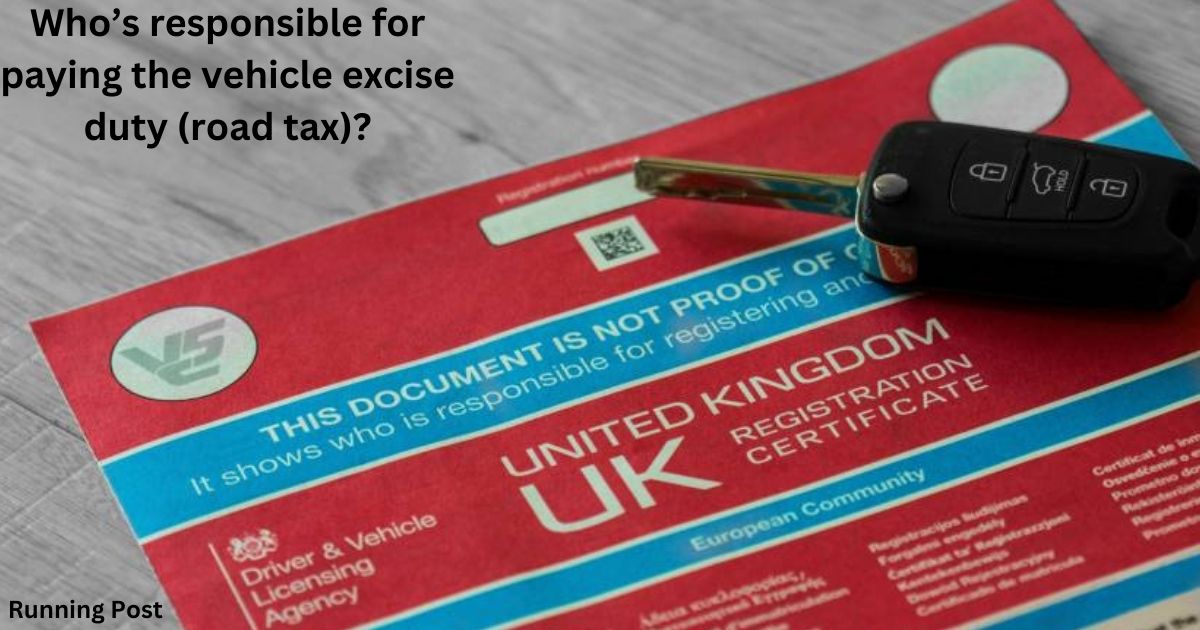| A: The driver of the vehicle | B: The Vehicle Manufacturer | C: The registered keeper of the vehicle | D: The DVLA |
Understand The Who’s Responsible for Paying the Vehicle Excise Duty (Road Tax)?
Vehicle Excise Duty (VED), or road tax, is a mandatory charge that vehicle owners in the UK must pay to legally use their vehicles on public roads. This tax is crucial for maintaining road infrastructure and supports environmental initiatives. Understanding who is responsible for paying VED helps ensure compliance with legal requirements and prevents potential fines.
Explanation:
- Purpose of VED: Ensures legal road use and supports road maintenance.
- Legal Requirement: All vehicles must have valid VED to operate legally.
- Impact of Non-Compliance: Failure to pay VED can result in fines and penalties.
Understanding Vehicle Excise Duty

What is Vehicle Excise Duty in the UK?
Vehicle Excise Duty (VED) is a tax levied on vehicles registered in the UK. The tax amount varies based on factors such as CO2 emissions, fuel type, and engine size. VED is used to fund road maintenance and infrastructure projects, making it a key component of the UK’s road management system.
Explanation:
- Tax Variation: Amount depends on emissions, fuel type, and engine size.
- Purpose: Funds road maintenance and infrastructure.
- Legal Requirement: Must be paid annually for the vehicle to be roadworthy.
Definition and Purpose
VED aims to reduce road congestion and environmental impact by encouraging the use of eco-friendly vehicles. The tax structure is tiered based on emissions, promoting the adoption of lower-emission vehicles. This approach aligns with broader environmental goals and generates revenue for maintaining roads.
Explanation:
- Emission-Based Tax: Higher emissions result in higher tax rates.
- Incentives: Encourages the use of cleaner vehicles.
- Revenue Generation: Supports road maintenance and infrastructure.
How Vehicle Excise Duty Affects Vehicle Ownership
The cost of VED can influence vehicle ownership decisions. Prospective buyers often consider the tax implications when choosing between vehicles. Vehicles with higher emissions incur higher VED, which may deter environmentally-conscious buyers, while lower-emission vehicles benefit from reduced or zero road tax.
Explanation:
- Influence on Buyers: Higher tax may deter purchase.
- Environmental Impact: Lower emissions result in lower tax rates.
- Financial Consideration: VED affects overall cost of vehicle ownership.
What is Excise Tax in the UK?
Excise tax is a broader term that includes various taxes on specific goods and activities, such as alcohol, tobacco, and fuel. Unlike VED, which is specific to vehicles, excise taxes cover a wide range of products and services. These taxes aim to regulate consumption and generate revenue.
Explanation:
- Scope: Includes taxes on goods like alcohol and tobacco.
- Purpose: Regulates consumption and raises revenue.
- Difference from VED: VED is specific to vehicles, while excise tax covers various goods.
Overview of Excise Tax
Excise taxes are indirect taxes imposed on certain goods and services, aimed at discouraging consumption and generating government revenue. These taxes affect products such as luxury items and harmful substances, and play a role in public health and economic regulation.
Explanation:
- Indirect Tax: Imposed on goods and services.
- Regulation: Discourages consumption of harmful products.
- Revenue Generation: Funds public services and health initiatives.
Comparison with Vehicle Excise Duty
While both VED and general excise taxes are forms of indirect taxation, they differ in their application. VED is specifically for vehicles and varies with emissions, while general excise taxes apply to a range of goods and services, influencing consumption and generating revenue.
Explanation:
- Application Difference: VED is for vehicles, general excise is for goods/services.
- Tax Structure: VED is emission-based, excise taxes vary by product.
- Purpose: VED supports road infrastructure, excise taxes regulate consumption.
Historical Context
Who Introduced Road Tax in the UK?
Road tax in the UK was introduced to address the growing number of vehicles and the need for better road maintenance. The concept emerged in the early 20th century to regulate motor vehicles and ensure they contributed to road upkeep.
Explanation:
- Historical Origin: Introduced in the early 20th century.
- Purpose: Address vehicle growth and road maintenance needs.
- Legislative Impact: Set the stage for modern road tax systems.
Historical Background
The first road tax system was established by the Road Traffic Act of 1909, which aimed to regulate vehicle registration and tax collection. Initially based on engine size and vehicle weight, the system has evolved with advancements in vehicle technology and changing regulations.
Explanation:
- Initial Legislation: Road Traffic Act of 1909.
- Original Criteria: Based on engine size and weight.
- Evolution: Adjusted over time for new technologies and regulations.
Evolution of Road Tax Legislation
Road tax legislation has undergone significant changes to reflect advancements in vehicle technology and environmental concerns. The introduction of emission-based tax bands in the 2000s marked a shift towards encouraging eco-friendly vehicles and aligning with environmental goals.
Explanation:
- Legislative Changes: Adjusted for technological advancements.
- Emission-Based Bands: Introduced to promote cleaner vehicles.
- Environmental Goals: Aligns road tax with sustainability efforts.
You Also Like It:
What will happen if your car’s wheels are unbalanced?
What’s the purpose of a catalytic converter?
On a motorway, where would you see green reflective studs?
Responsibility for Payment
Who Pays Road Tax in the UK?
The registered keeper of a vehicle is responsible for paying Vehicle Excise Duty. This person, listed on the vehicle’s registration documents, must ensure that the tax is paid annually and remains valid for legal road use.
Explanation:
- Responsibility: Falls on the registered keeper.
- Legal Obligation: Must ensure tax is up-to-date.
- Potential Consequences: Failure to pay can result in fines.
Explanation of Responsibility
The registered keeper is responsible for renewing the Vehicle Excise Duty annually and complying with changes in tax regulations. This role includes managing payments and addressing any issues related to the vehicle’s tax status.
Explanation:
- Renewal: Must renew VED annually.
- Compliance: Adhere to tax regulations and updates.
- Fines and Penalties: Failure to comply results in financial penalties.
The Role of the Registered Keeper
The registered keeper is crucial in maintaining legal compliance for vehicle ownership. They must ensure the vehicle is roadworthy, insured, and meet all legal requirements, including paying the Vehicle Excise Duty.
Explanation:
- Legal Compliance: Ensure vehicle meets all legal requirements.
- Roadworthiness: Maintain vehicle condition.
- Insurance: Ensure valid insurance coverage.
Who’s Responsible for Paying the Vehicle Excise Duty (Road Tax)?
Detailed Answer: The Registered Keeper of the Vehicle
The registered keeper is the individual or entity listed on the vehicle’s registration documents and is legally responsible for paying Vehicle Excise Duty. This responsibility includes ensuring the tax is paid on time and that the vehicle remains compliant with all legal requirements.
Explanation:
- Legal Responsibility: Falls on the registered keeper.
- Payment Duty: Ensure timely payment of VED.
- Compliance: Maintain compliance with vehicle regulations.
Responsibilities and Obligations of the Registered Keeper
The registered keeper must manage several responsibilities, including paying the Vehicle Excise Duty, keeping the vehicle insured, and ensuring it is roadworthy. Additionally, they must inform the DVLA of any changes in the vehicle’s status or their personal details.
Explanation:
- Payment Management: Handle VED payments and renewals.
- Insurance and Maintenance: Keep the vehicle insured and in good condition.
- DVLA Notifications: Update vehicle status and personal details.
Conclusion
Summary of Key Points
In conclusion, Vehicle Excise Duty is a vital component of vehicle ownership in the UK. The registered keeper is responsible for paying this tax, which supports road maintenance and encourages environmentally friendly vehicle use. Understanding these responsibilities helps ensure legal compliance and avoids potential penalties.
Explanation:
- VED Importance: Supports road maintenance and environmental goals.
- Registered Keeper’s Role: Responsible for tax payment and compliance.
- Avoid Penalties: Understanding responsibilities helps prevent fines.
Recap of Vehicle Excise Duty and Excise Tax
Vehicle Excise Duty is a specific form of excise tax related to vehicle ownership. It differs from general excise taxes, which cover various goods and services. Both types of taxes play crucial roles in the UK’s tax system, serving different purposes.
Explanation:
- VED: Specific to vehicles and road use.
- General Excise Taxes: Cover a range of goods and services.
- Purpose: Both taxes support different aspects of government revenue and regulation.
Importance of Understanding Road Tax Responsibilities
Understanding who is responsible for paying Vehicle Excise Duty and the associated obligations is essential for all vehicle owners. Proper compliance ensures legal operation of vehicles and helps avoid fines and legal issues.
Explanation:
- Legal Operation: Ensures vehicles are legally roadworthy.
- Avoiding Fines: Proper payment and compliance prevent penalties.
- Informed Ownership: Helps in better vehicle management and planning.
You Also Like It:
Releated Posts
MAB Instructor Certification: Your Gateway to Professional Crisis Management Leadership
In today’s fast-evolving professional environments—especially in healthcare, mental health, education, and corrections—conflict and aggression can arise without warning.…
Freewayget.com: Your Ultimate Platform for Deals, Discounts, and Digital Products
Introduction to Freewayget.com In today’s fast-paced digital world, finding reliable platforms that offer authentic discounts, deals, and digital…
Affordable & Fast Embroidery Digitizing Services in Your Area
Embroidery digitizing services provide corporations, designers, and people with brilliant embroidery-equipped designs by means of changing art work…
Introduction to hdhub4u nit
In this article, we will delve into the details of hdhub4u nit, exploring its features, benefits, and why…

















